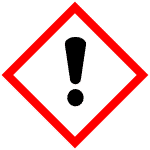碘化钴, 99.5% trace metals basis,Cobalt(II) iodide
产品编号:西域试剂-WR363259| CAS NO:15238-00-3| MDL NO:MFCD00016030| 分子式:CoI2| 分子量:312.74
本网站销售的所有产品仅用于工业应用或者科学研究等非医疗目的,不可用于人类或动物的临床诊断或者治疗,非药用,非食用,
| 英文名称 | Cobalt(II) iodide |
|---|---|
| CAS编号 | 15238-00-3 |
| 产品熔点 | 515ºC |
| 产品沸点 | 570ºC |
| 产品密度 | 5.68 |
| 产品闪点 | 570ºC vac. |
| 精确质量 | 312.74200 |
| LogP | 1.77140 |
| 外观性状 | powder |
| 溶解性 | 每100毫升水中的溶解克数: 203g/20℃ |
| 稳定性 | 有两种变体。(1)αCoI2。黑色六方晶体。易吸水,在空气中呈墨绿色。相对密度5.68。熔点515℃(高真空)。沸点570℃(高真空)。易溶于水、乙醇和丙酮。水溶液呈桃红色至红色。由钴粉在碘化氢气流中加热至400~500℃而得。(2)βCoI2。黄色针状晶体。相对密度5.45(25℃)。易吸水,在潮湿空气中形成绿色滴液。水溶液加热时变为玫瑰红色。加热至400℃时变黑,并转变成αCoI2。由αCoI2在高真空升华而得。六水合物为棕红色六方晶体,有吸水性,相对密度2.90,加热大于27℃时开始脱水,在130℃时变成无水物,见光或曝置于空气中放出碘,由碳酸钻或氢氧化钴溶于氢碘酸而得。 |
| 储存条件 | 常温密闭避光,通风干燥惰性气体下 |
相关文档
化学品安全说明书(MSDS)
下载MSDS质检证书(COA)
相关产品
| 符号 |

GHS07 |
|---|---|
| 信号词 | Warning |
| 危害声明 | H302 + H312 + H332-H315-H319-H335 |
| 警示性声明 | P261-P280-P305 + P351 + P338 |
| 个人防护装备 | dust mask type N95 (US);Eyeshields;Gloves |
| 危害码 (欧洲) | Xn |
| 风险声明 (欧洲) | R20/21/22;R36/37/38 |
| 安全声明 (欧洲) | S26;S36 |
| 危险品运输编码 | NONH for all modes of transport |
| WGK德国 | 3 |
|
Section 1: Product Identification Chemical Name:Cobalt (II) iodide, anhydrous, 99.5% CAS Registry Number:15238-00-3 Formula:CoI2 EINECS Number:239-283-2 Chemical Family:metal halide Synonym:Cobaltic iodide
Section 2: Composition and Information on Ingredients IngredientCAS NumberPercentACGIH (TWA)OSHA (PEL) Title Compound15238-00-3100%0.02mg/m3 (as Co)no data Section 3: Hazards Identification Irritating to skin, eyes and respiratory tract. May be harmful if swallowed. Prolonged exposure to iodide salts Emergency Overview: may produce a mild toxic syndrome known as iodism. Limited evidence of a carcinogenic effect. Primary Routes of Exposure:Contact with skin and eyes. Inhalation of dust. Eye Contact:Contact with eyes causes irritation, redness, and pain. Skin Contact:Causes irritation to skin. Symptoms include redness, itching, and pain, pimples, boils, hives and blisters. Inhalation:Causes irritation to the respiratory tract. Symptoms may include coughing and shortness of breath. Ingestion:Large oral doses may cause irritation to the gastrointestinal tract Acute Health Affects:Irritating to skin, eyes and respiratory tract. Limited evidence of a carcinogenic effect. Chronic ingestion of iodides may produce iodism. Symptoms include Chronic Health Affects:skin rash, running nose, headache and irritation of mucous membranes. Cobalt may cause goiter and reduced thyroid activity, dermatitis, kidney, heart and lung damage. NTP:No IARC:Yes OSHA:No SECTION 4: First Aid Measures Immediately flush the eyes with copious amounts of water for at least 10-15 minutes. A victim may need Eye Exposure: assistance in keeping their eye lids open. Get immediate medical attention. Wash the affected area with water. Remove contaminated clothes if necessary. Seek medical assistance if Skin Exposure: irritation persists. Remove the victim to fresh air. Closely monitor the victim for signs of respiratory problems, such as difficulty Inhalation: in breathing, coughing, wheezing, or pain. In such cases seek immediate medical assistance. Seek medical attention immediately. Keep the victim calm. Give the victim water (only if conscious). Induce Ingestion: vomiting only if directed by medical personnel. SECTION 5: Fire Fighting Measures Flash Point:not applicable Autoignition Temperature:none Explosion Limits:none Extinguishing Medium:none required If involved in a fire, fire fighters should be equipped with a NIOSH approved positive pressure self-contained Special Fire Fighting Procedures: breathing apparatus and full protective clothing. Hazardous Combustion andnone Decomposion Products: Unusual Fire or Explosion Hazards: No unusual fire or explosion hazards. SECTION 6: Accidental Release Measures To avoid raising dust, small spills may be mixed with diatomaceous earth, sand, vermiculite or other suitable Spill and Leak Procedures: inert material and swept up. SECTION 7: Handling and Storage Handling and Storage:Store solid in a tightly sealed container. SECTION 8: Exposure Controls and Personal Protection Eye Protection:Always wear approved safety glasses when handling a chemical substance in the laboratory. Skin Protection:Wear appropriate chemical resistant gloves and protective clothing. Ventilation:If possible, handle the material in an efficient fume hood. If in form of fine dust and ventilation is not available a respirator should be worn. The use of respirators Respirator: requires a Respirator Protection Program to be in compliance with 29 CFR 1910.134. Ventilation:If possible, handle the material in an efficient fume hood. Additional Protection:No additional protection required. SECTION 9: Physical and Chemical Properties Color and Form:-60 mesh black pwdr. Molecular Weight:312.74 Melting Point:515° (vac.) Boiling Point:570°C (vac.) Vapor Pressure:no data Specific Gravity:5.68 Odor:none Solubility in Water: SECTION 10: Stability and Reactivity Stability:hygroscopic Hazardous Polymerization:no hazardous polymerization Conditions to Avoid:contact with moisture Incompatibility:Halogens, oxidizing agents and active metals Decomposition Products:none SECTION 11: Toxicological Information RTECS Data:No specific information available on this product. Carcinogenic Effects:Possible carcinogen (as Co) Mutagenic Effects:no data Tetratogenic Effects:no data SECTION 12: Ecological Information Ecological Information:No information available SECTION 13: Disposal Considerations Disposal:Dispose of according to local, state and federal regulations. SECTION 14: Transportation Shipping Name (CFR):Non-hazardous Hazard Class (CFR):NA Additional Hazard Class (CFR):NA Packaging Group (CFR):NA UN ID Number (CFR):NA Shipping Name (IATA):Non-hazardous Hazard Class (IATA):NA Additional Hazard Class (IATA):NA Packaging Group (IATA):NA UN ID Number (IATA):NA SECTION 15: Regulatory Information TSCA:Listed in the TSCA inventory. SARA (Title 313):Title compound: See category N096 for reporting. Second Ingredient:none SECTION 16 - ADDITIONAL INFORMATION N/A |








 浙公网安备 33010802013016号
浙公网安备 33010802013016号